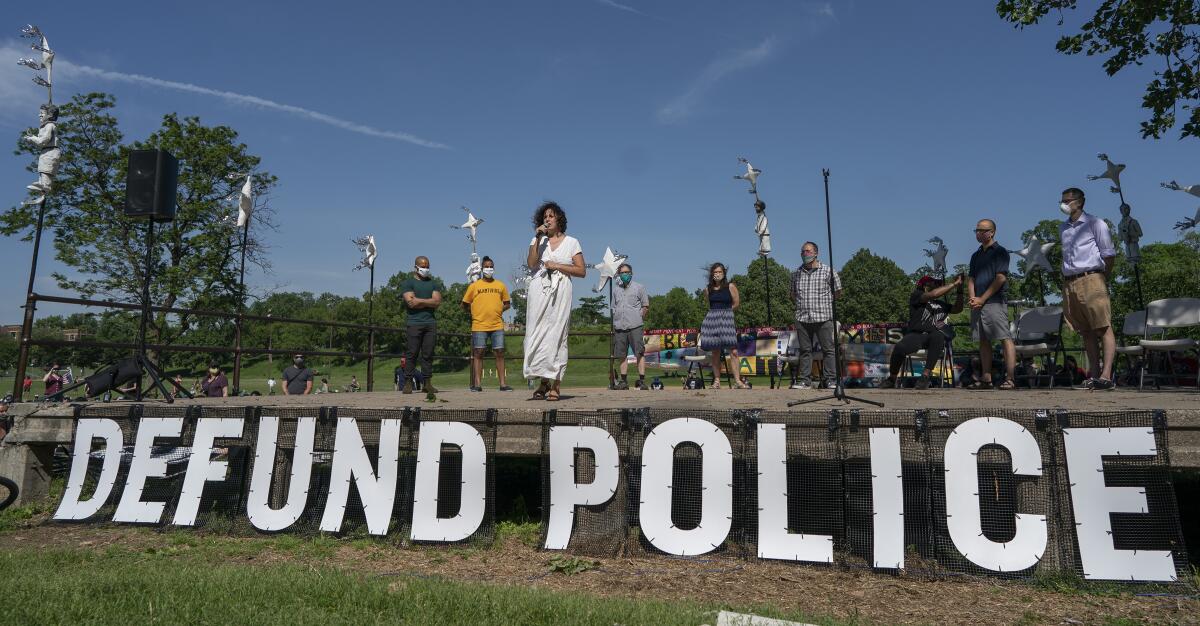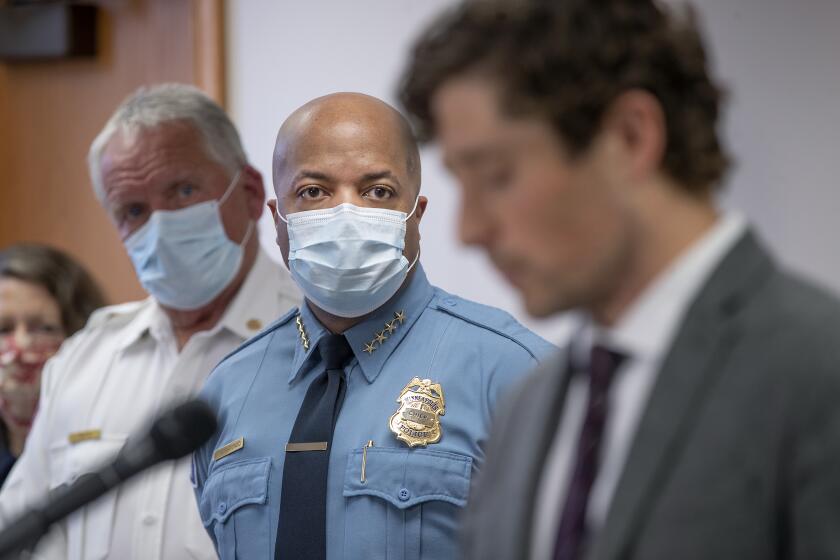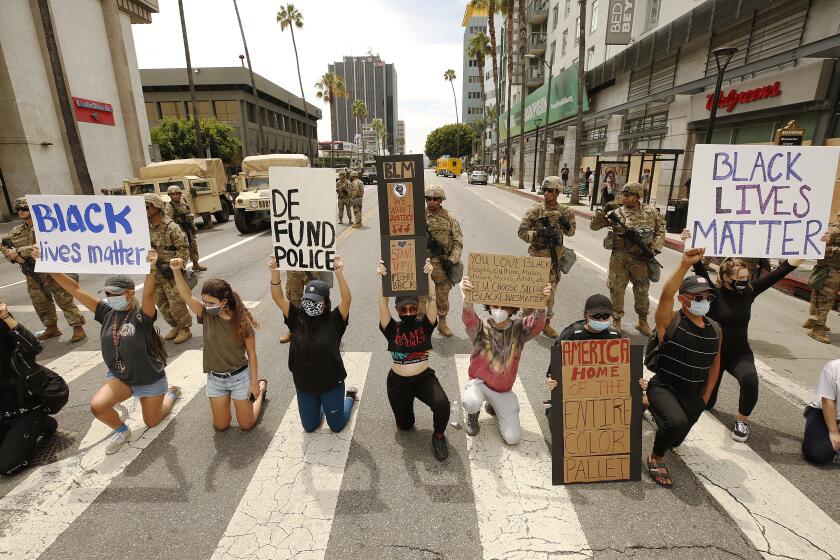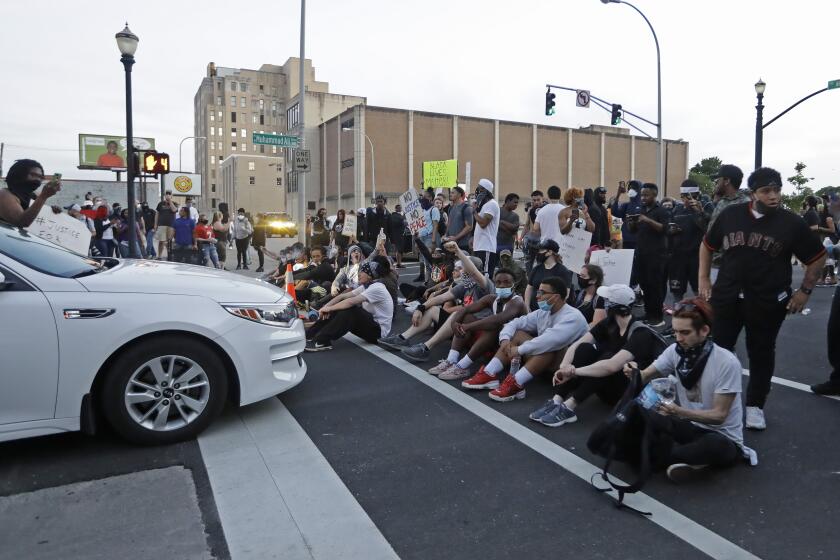Can disbanding an entire police force work? Some Minneapolis activists doubt it

- Share via
MINNEAPOLIS — George Floyd’s death was the breaking point for some Minneapolis civic leaders, who now say the only way to fix the city’s beleaguered police department is to ditch it. But it’s not clear how they would do that, and groups that have spent years shining a light on police brutality aren’t sure it’s the answer.
“We’re dismantling our police department,” City Council member Jeremiah Ellison tweeted Sunday, the same day that he and a majority of the council proclaimed support to disband the force, to cheering protesters at a Minneapolis park. “And we won’t be silent. We’ll be loud. We’ll fight. We’ll win.”
But dismantling an entire department is exceedingly rare. It was done in Camden, N.J., and was talked about — though ultimately discarded — in Ferguson, Mo., after the death of Michael Brown. Such a move comes with obstacles, including a city charter that stipulates a police force, plus a union-protected workforce.
“Saying that they’re going to defund the police or that they’re going to ban the police or whatever they’re talking about, that was optics, guys,” said Michelle Gross, president of the Minneapolis chapter of Communities United Against Police Brutality. “Just plain optics.”
Sam Martinez, an activist with Twin Cities Coalition for Justice for Jamar, a group formed after the 2015 death of Jamar Clark in a confrontation with police, said just getting rid of a police department doesn’t solve the problem.
“If they attempted to defund the police or reduce the police force, we know they can’t do it, and what comes after that? Will they turn over the power to the [county] sheriff ... who has had no accountability either?” Martinez said.
Many hoped Minneapolis’ first black police chief could reform a department that critics say too often uses excessive force against people of color.
Community activists have criticized the Minneapolis department for years for what they say is a racist and brutal culture that resists change. The state of Minnesota launched a civil rights investigation into the department last week, and the first concrete changes came Friday in a stipulated agreement in which the city agreed to ban chokeholds and neck restraints.
Steve Cramer, a former City Council member who now serves as president and CEO of the Minneapolis Downtown Council, called rhetoric about ending policing as the city knows it “exhilarating to some but terrifying to others.”
“Until we really understand how this kind of evaluation and planning process is going to move forward, there’s this vacuum that people are going to fill with their own thoughts,” he said, adding: “That’s just a hard place that some of our elected officials have put our community in at a very vulnerable time.”
Protesters nationwide are demanding police reforms, and calls to “defund the police” over the death of Floyd and other black Americans killed by law enforcement have become a rallying cry. Supporters say the movement isn’t about eliminating police departments or stripping agencies of all their money. Instead, they say it is time for the country to address systemic problems in policing in America and spend more on what communities across the U.S. need, such as housing and education.
The call to cut the LAPD budget should be the beginning of a larger rethinking of the mission and scope of the Police Department.
Gross’ group, along with others such as Minnesota’s Council on American-Islamic Relations and two Black Lives Matter chapters, presented their own 40 recommendations for police reform Monday. They gathered at the remnants of the Third Precinct station, which was set ablaze by protesters at the height of violent unrest following Floyd’s death.
Among the recommendations, officers would be required to carry their own professional liability insurance, an idea that aims to hike out-of-pocket insurance rates for officers who engage in high-risk conduct. Some of the worst offenders would become uninsurable and forbidden from working as a police officer.
The groups also are seeking an independent agency to investigate and prosecute critical incidents involving police, mandatory psychological testing for officers and community participation in negotiating police union contracts. They would end so-called “warrior” training for officers and the use of “no-knock” warrants, while banning military equipment in community policing as well as neck restraints and chokeholds.
In Ferguson, where the 2014 shooting death of Brown, an unarmed 18-year-old, galvanized the fledgling Black Lives Matter movement, the city and U.S. Justice Department entered a consent agreement that required massive reforms overseen by a court-appointed monitor. Among the results are a department with significantly more black officers, a police use-of-force policy and progress in use of body-worn and in-car cameras.
The gunfire that killed a black woman and wounded a police detective who crashed through her door has fueled debate over so-called no-knock warrants.
Ferguson spent $1.1 million in the first three years of the consent agreement and expects to spend $1 million more over the next three years — a significant investment for a city with an annual budget of less than $13 million.
Changes are being talked about elsewhere, too. In New York, Mayor Bill de Blasio said Sunday that the city would move funding from the NYPD to youth initiatives and social services while keeping the city safe, but he didn’t give details. In Los Angeles, Mayor Eric Garcetti vowed to cut as much as $150 million that was part of a planned increase in the police department’s budget.
Minneapolis Mayor Jacob Frey, who was booed at a rally Saturday outside his house when he said he does not support abolishing the department, repeated that stance Monday. In an interview with ABC’s “Good Morning America,” he said he looked forward to “deciphering” what council members mean by such talk.
He said he favors “a full-on cultural shift in how our Minneapolis Police Department and departments throughout the country function.”
Breaking News
Get breaking news, investigations, analysis and more signature journalism from the Los Angeles Times in your inbox.
You may occasionally receive promotional content from the Los Angeles Times.
“We have difficulty both terminating and disciplining officers, and then getting that termination or discipline to stick,” Frey said. “We’re going after the police union, the police union contract, the arbitration provisions that mandate that we have arbitration at the end of the process and oftentimes that reverts the officer to right back where they were to begin with.”
Alondra Cano, one of the nine council members who said they support disbanding, called impending change “a process” that is just beginning. She invited community input.
“Nobody is saying we want to abolish health or safety,” Cano said Monday in a radio interview. “What we are saying is we have a broken system that is not producing the outcomes we want.”
More to Read
Sign up for Essential California
The most important California stories and recommendations in your inbox every morning.
You may occasionally receive promotional content from the Los Angeles Times.













